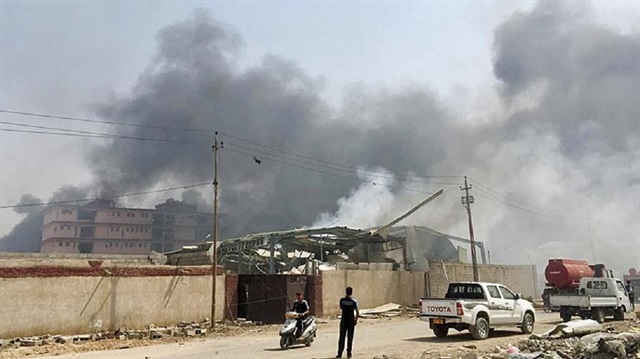
In northern Iraq, meanwhile, army braces for decisive push on Daesh-held city of Mosul
At least six people were killed -- including an army officer -- in separate acts of violence throughout Iraqi capital Baghdad on Sunday, a security source told Anadolu Agency.
An unidentified sniper opened fire on soldiers manning a security checkpoint in the city's southern Al-Dora area, killing an army officer, Police Colonel Salem al-Numan told Anadolu Agency.
In a separate incident, according to Numan, two civilians were killed and another seven injured when a bomb went off near a crowded market in northern Baghdad's Sabaa al-Bor area.
Another two civilians were killed and nine others injured when a second bomb went off in Baghdad's western Furat neighborhood, while a third was killed -- and another four injured -- when yet another explosive device went off in the southern Al-Wahda district, according to the police officer.
While there has been no claim of responsibility, Baghdad in recent months and years has witnessed violent attacks -- which often target civilians -- on an almost daily basis.
The authorities typically blame such attacks on the Daesh terrorist group, which still enjoys a significant presence in war-torn Iraq despite having suffered a string of recent military defeats.
The latest rash of attacks came only hours after eight people were killed in a suicide attack -- soon claimed by Daesh -- in a Shia-majority area to the west of Baghdad.
In a related development Sunday, the army's northern Nineveh Operations Command announced the completion of a pontoon bridge over the Zab River in the Makhmur district's Kuwair area located southeast of the Daesh-held city of Mosul.
According to Army Lieutenant Colonel Saadoun al-Duleimi, the "high-durability" bridge -- to be used in an anticipated army assault on Mosul -- is capable of supporting standard road vehicles in addition to armored combat vehicles.
The bridge, al-Duleimi told Anadolu Agency, "will facilitate the rapid deployment of troops from the Kuwair area to the opposite bank of the river in the Al-Hamdaniya district, 25 kilometers from Mosul".
Iraq's security situation has deteriorated markedly since mid-2014, when Daesh captured Mosul -- the country's second largest city -- along with vast swathes of territory in the country's northern and western regions.
In recent months, the Iraqi army, backed by U.S.-led coalition airstrikes and local allies on the ground, has since managed to retake much territory. Nevertheless, the terrorist group remains in firm control of several parts of the country, including Mosul.
Army forces and peshmerga fighters have recently captured several areas on the outskirts of Mosul, which Iraqi officials have vowed to recapture by year's end.
Hello, the comments you share on our site are a valuable resource for other users. Please respect other users and different opinions. Do not use rude, offensive, derogatory, or discriminatory language.
The floor is all yours.








